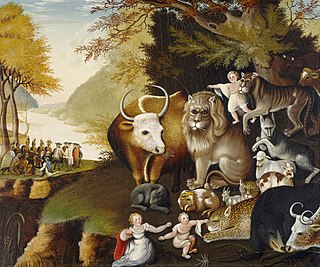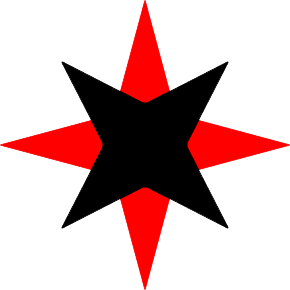Related Research Articles
A Quaker Action Group (AQAG) was founded in Philadelphia during the summer of 1966 to "apply nonviolent direct action as a witness against the war in Vietnam".

The views of Quakers around the world towards homosexuality encompass a range from complete celebration and the practice of same-sex marriage, to the view that homosexuality is sinfully deviant and contrary to God's intentions for sexual expression. The Religious Society of Friends (Quakers) is a historically Christian religious movement founded in 17th-century England; it has around 350,000 members. In Britain, Canada, New Zealand and Australia, many Quakers are supportive of homosexual relationships, while views are divided among U.S. meetings. The majority (52%) of Quakers live in Africa and many there do not support homosexual relationships.

Light of God, Light of Christ, Christ within, That of God, Spirit of God within us, Light within, inward light and inner light are related phrases commonly used within the Religious Society of Friends (Quakers) as metaphors for Christ's light shining on or in them. It was propagated by the founder of the Quaker movement, George Fox, who "preached faith in and reliance on 'inward light' ". The first Quakers were known to sit in silence and meditate on the words of the Bible until they felt the inward light of God shining upon them and the Holy Spirit speaking.
Meeting for Sufferings is an executive committee of Britain Yearly Meeting, the body which acts on behalf of members of the Religious Society of Friends (Quakers) in Great Britain and the Crown Dependencies. It has about 200 members who meet five times a year to make decisions when the Yearly Meeting is not in session.

The Yearly Meeting of the Religious Society of Friends (Quakers) in Britain, also known as the Britain Yearly Meeting, is a Yearly Meeting of the Religious Society of Friends (Quakers) in England, Scotland, Wales, the Channel Islands and the Isle of Man. It is the national organisation of Quakers living in Britain. Britain Yearly Meeting refers to both the religious gathering and the organisation. "Yearly Meeting" is usually the name given to the annual gathering of British Quakers. Quakers in Britain is the name the organisation is commonly known by.

Peace testimony, or testimony against war, is a shorthand description of the action generally taken by members of the Religious Society of Friends (Quakers) for peace and against participation in war. Like other Quaker testimonies, it is not a "belief", but a description of committed actions, in this case to promote peace, and refrain from and actively oppose participation in war. Quakers' original refusal to bear arms has been broadened to embrace protests and demonstrations in opposition to government policies of war and confrontations with others who bear arms, whatever the reason, in the support of peace and active nonviolence. Because of this core testimony, the Religious Society of Friends is considered one of the traditional peace churches.
The Religious Society of Friends began as a movement in England in the mid-17th century in Lancashire. Members are informally known as Quakers, as they were said "to tremble in the way of the Lord". The movement in its early days faced strong opposition and persecution, but it continued to expand across the British Isles and then in the Americas and Africa.
Young Friends General Meeting (YFGM) is the national organisation for young Quakers in the United Kingdom. The name refers both to the organisation and to the General Meetings which are held in February, May and October each year, in various Quaker Meeting Houses in Britain. The organization also publishes a tri-annual magazine entitled The Young Quaker.
Yearly Meeting is a term used by members of the Religious Society of Friends, or Quakers, to refer to an organization composed of constituent meetings or churches within a geographical area. The constituent meetings are called Monthly Meetings in most of the world; in England, local congregations are now called Area Meetings, in Australia Monthly Meetings are called Local Meetings. "Monthly" and "Yearly" refer to how often the body meets to make decisions. Monthly Meetings are local congregations which hold worship on Sunday. Depending on the Yearly Meeting organization, there may also be Quarterly Meetings, Half-Yearly Meetings, or Regional Meetings, where a number of local Monthly Meetings come together within a Yearly Meeting.
Within the Religious Society of Friends, a clerk is someone responsible for various administrative functions within a meeting for worship for church affairs or meeting for worship with attention to business. The clerk is responsible for recording the discernment which is arrived at during such a meeting, in a minute, and is responsible for sending and receiving correspondence on behalf of the meeting. Within some branches of the Religious Society of Friends, the clerk may also create an agenda and may facilitate the meeting.
The Friends World Committee for Consultation (FWCC) is a Quaker organisation that works to communicate between all parts of Quakerism. FWCC's world headquarters is in London. It has General Consultative NGO status with the Economic and Social Council of the United Nations since 2002. FWCC shares responsibility for the Quaker UN Office in Geneva and New York City with the American Friends Service Committee and Britain Yearly Meeting.
Eric Baker was a British activist and one of the founders of the human rights group Amnesty International, and the second Secretary-General of the organization. He was also a founder of the Campaign for Nuclear Disarmament (CND).
Quaker Peace & Social Witness (QPSW), previously known as the Friends Service Council, and then as Quaker Peace and Service, is one of the central committees of Britain Yearly Meeting of the Religious Society of Friends - the national organisation of Quakers in Britain. It works to promote British Quakers' testimonies of equality, justice, peace, simplicity and truth. It works alongside both small local and large international pressure groups.

Quakers, also called Friends, belong to a historically Christian (Protestant) denomination known formally as the Religious Society of Friends. Members of the various Quaker movements are all generally united by their belief in the ability of each human being to experientially access the light within, or "that of God in every one".
The Quaker movement began in England in the Seventeenth Century. Small Quaker groups were planted in various places across Europe during this early period. Quakers in Europe outside Britain and Ireland are not now very numerous although new groups have started in the former Soviet Union and satellite countries. By far the largest national grouping of Quakers in Europe is in Britain.
A Book of Discipline may refer to one of the various books issued by a Yearly Meeting of the Religious Society of Friends, setting out what it means to be a Quaker in that Yearly Meeting. The common name for this book varies from one Yearly Meeting to another and includes Book of Discipline, Faith and Practice, Christian Faith and Practice, Quaker Faith and Practice, Church Government and Handbook of Practice and Procedure. Each Book of Discipline is updated periodically by each Yearly Meeting according to the usual practice of decision making within the Religious Society of Friends.
Howard Haines Brinton (1884–1973) was an author, professor and director whose work influenced the Religious Society of Friends movement for much of the 20th century. His books ranged from Quaker journal anthologies to philosophical and historical dissertations on the faith, establishing him as a prominent commentator on the Society of Friends.
Mid-India Yearly Meeting is a yearly meeting of the Religious Society of Friends in Madhya Pradesh state in mid-India. Quakerism came to mid-India as a result of missionaries from London Yearly Meeting who were members of the Friends Foreign Mission Association. Missions were established in Mid-India in 1866 by the Friends Foreign Mission Association. Mid-India Yearly Meeting was founded as an independent yearly meeting in 1907 in Hoshangabad.

The Canadian Friends Service Committee (CFSC) is a charity that acts on the peace and social justice concerns of the Religious Society of Friends (Quakers) in Canada. CFSC is guided by a vision of a world in which peace and justice prevail, where the causes of war and oppression are removed, a world in which the whole of Creation is treated with respect and where individuals and communities are freed to reach their fullest potential.
William Savery was an American Quaker, an active preacher, an abolitionist and a defender of the rights of Native Americans.
References
- ↑ Britain Yearly Meeting. "Quakers in Britain - Quaker Life". Britain Yearly Meeting. Retrieved 2009-06-15.
- ↑ "Quaker Life Central Committee". Quakers. Retrieved 2016-07-13.
- 1 2 3 London Yearly Meeting of the Religious Society of Friends (1931). "Chapter X: Standing Committees". Church Government. London: Friends Book Centre. p. 69.
- ↑ "Parishes: Grays Thurrock | British History Online". www.british-history.ac.uk. Retrieved 2016-07-13.
- ↑ The Yearly Meeting of the Religious Society of Friends (Quakers) in Britain (1995). "8:05". Quaker Faith and Practice (1st ed.). ISBN 0-85245-269-1.